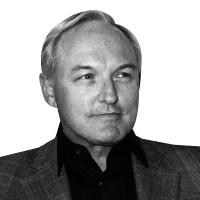
A lot has been written lately about what a dreadful decade the “Aughts” have been. No argument there. So it seems fitting that a decade that began with 9/11 should come to a close with the theft of the “Arbeit Macht Frei” sign over the front entrance to Auschwitz.
If you have been there yourself, then this bizarre, profane event may feel somehow personal. I remember the moment I walked beneath it, some years ago. It was a mild winter day, but the temperature seemed instantly to drop. The term “a chill up the spine” is a cliché, but there it is.
The image that sticks in the mind—in my mind at the moment—is the one of SS officer Hoecker lighting candles on a Christmas tree.
The irony, of course, is that the slogan—“Work Makes You Free”—was intended to cheer you up as you arrived. It was devised by SS Obersturmbannführer Rudolf Höss, Auschwitz’s creator and commandant. The idea was to forestall panic—crowd control. Surely a place whose motto was predicated on incentive couldn’t be that bad, right? The guide told me that on occasion, they even had inmates playing chamber music as new arrivals entered, to create a calm atmosphere. Ein kleine nachtmusik.
Höss, being an educated man, would have known his Dante, who devised the most famous entrance slogan of all: Lasciate ogni speranza, voi ch’entrate. The architect of hell didn’t trouble with putting a smiley face over the front door. “Abandon Hope, All Ye Who Enter Here” is perfectly straightforward. Jean Paul Sartre rendered the idea with neat, existential taciturnity: “No Exit.” Sartre is also famous, it occurs, for a witty definition of hell: “Other people.” ( L’enfer, c’est les autres.) Very… French.
The police have recovered the stolen sign. The authorities are expressing shock over the laxness of the security. This will certainly be remedied. The outrage over the incident is loud and international. The latest news is that it may have been the work of a terror cell in—of all places— Sweden (neutral in World War Two, and a haven for many escaped Jews). Perhaps the awful event has served some useful purpose. How many among us were aware a week ago that Auschwitz is under-funded as a museum? Donations should pour in. Auschwitz is a strange place on which to meditate this time of year. The sign theft triggers memory of another Auschwitz-Christmas moment: the discovery two years ago of a photo album kept by an SS officer there. His name was Karl Hoecker. It was given to the U.S. Holocaust Memorial Museum in Washington by a former American infantry officer who came across it in Germany after the war.
There are 16 pages containing 116 photographs, for the most part showing Auschwitz staffers unwinding. “Unwinding” was the word used in many of the media descriptions when the album came to light. One million murdered. It’s Miller Time. There are pictures of pretty young women singing along to a jolly officer on the accordion. In another, they’re eating blueberries on the front porch of the retreat not far from the death camp, where workers who’d been especially diligent were rewarded with a bit of R & R. There’s a picture of a male guard shaking paws with a German shepherd. Could it roll over and play dead? But the image that sticks in the mind—in my mind at the moment—is the one of SS officer Hoecker lighting candles on a Christmas tree.
The tradition of putting candles on Christmas trees actually began in Germany. The person who came up with the idea is thought to have been Martin Luther, father of the Reformation. Walking through a forest one night, meditating on the Nativity, he looked through the branches of a tree and saw a star. When he reached home, he recreated the vision by putting candles on a tree and lighting them.
Confronted with the image of SS officer Hoecker, dapper in his uniform, boots together in military style, reverentially lighting the candles on the tree with a long taper in honor of the birth of Jesus Christ, a Jew, the dissonance is so overwhelming that the mind simply goes blank. Normal faculties shut down. The hard drive crashes. Even trying to register moral outrage feels futile. One is left to wonder: Having lit the tree, did he go home and sing carols to his children? Put oranges in their Christmas stockings?
One month after the photograph was taken, Auschwitz was liberated. The 65th anniversary of that date is January 27. Perhaps it will be more intensely celebrated because of the events of this week. In that hope and on that note, let us—Christian, Jew, Muslim, Buddhist, atheist—all say, God bless us everyone.
Christopher Buckley's books include Supreme Courtship, The White House Mess, Thank You for Smoking, Little Green Men, and Florence of Arabia. He was chief speechwriter for Vice President George H.W. Bush, and is editor-at-large of ForbesLife magazine. His new book is Losing Mum and Pup, a memoir. Buckley's Daily Beast column is the winner of an Online Journalism Award in the category of Online Commentary.






